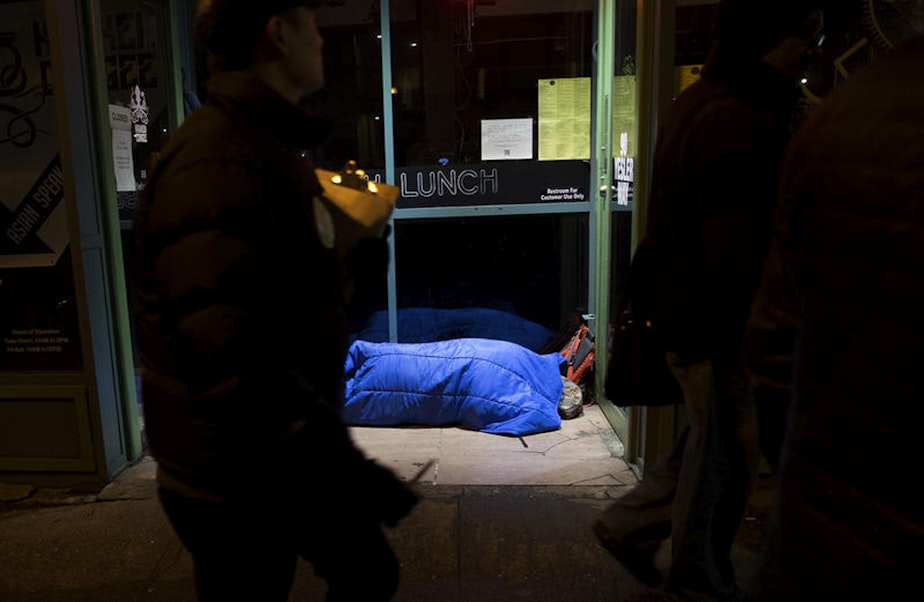3 years into crisis, number of homeless is still rising in Seattle

It’s been three years since Seattle and King County declared a state of emergency on homelessness.
On the anniversary, reporter Kate Walters told KUOW’s Angela King about what’s working in the struggle to help … and what’s not.
King: Three years into the emergency, where do things stand?
Walters: More people are homeless now than when the state of emergency was declared. On any given night in King County more than 12,000 people are homeless. That's compared to just over 10,000 people in that same count three years ago in 2015.
That comes from the annual One Night Count and it's worth noting that the method has changed a little bit in the past few years so it's not an apples to apples comparison.
But maybe a more accurate way to think about it is how many people need to access a homeless service every year and in 2017 that was 30,000 people in King County, which gives you just an idea of the scope of the issue.
What would you say has changed over the past three years?
The idea of the state of emergency was really to unlock funds from the state and the federal government. It's like when you declare it after a flood or an earthquake to really get that help pouring in. That did not happen.
There's been recognition that there's inefficiencies in our systems. We got a report in 2016 that stated that pretty bluntly. Another report this year from the King County auditor pointed out the same thing.
The city has shifted their funding priorities in the past three years as well. There's more of an emphasis now on tracking how well providers are getting people into permanent housing, not just how well they're serving them when they're in crisis on any given day.
And there's more focus on housing people in general and more money being spent to do that.
What would you say has been working thus far?
The city has put more services online and overall it looks like they're getting more people into housing than they have in past years. There's also more of a focus on 24-hour shelters -- the kind where people can bring their pets, their partners, their possessions, where they can come in and really kind of live in that space until they can move on to something better. And city data shows that those kinds of shelters are better at getting people into housing.
We're also seeing that the sheer number of people flooding in is still overwhelming the system. So even though we've had these improvements, the number of people who are becoming homeless is outweighing the number of people moving out of homelessness.
And there have been some failures that we've had over the past few years as well. The city hasn't worked out how to deal with people living in vehicles. And the number of people living in vehicles has gone up dramatically in the past year.
Do you know why we're seeing that spike?
It's unclear. It's one of those things when you look at 46 percent more people living in vehicles this year over last in the One Night Count, one thing that points to is a lack of shelter space and also a lack of shelter that people want.
So what’s next?
We've been hearing for a long time about the need for a regional approach to this problem. I'm going to be looking in the next year to see if the city and the county can really make that happen.
There’s also tension between the need to address the immediate crisis on the street and also the long-term need for housing. There’s a proposal in the City Council to set up a mega-tent type of shelter, and they're also looking at things like modular housing as a quicker way to help people when they get out of the shelter system.





